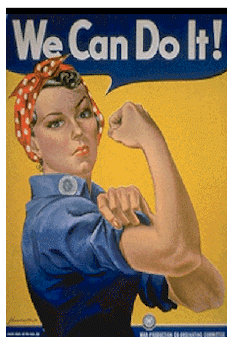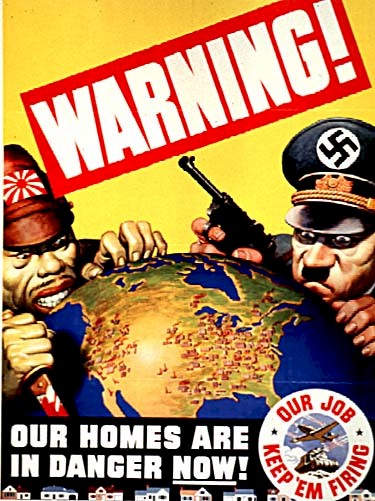

The United States and World War II
30HIST429-444
Dr. Bob Miller
556-9128
(w)
573-1446 (h)
707b
One Edwards (office hours by appointment)
email: millerrre@uc.edu


Textbooks:
Michael
J. Lyons, World War II: A Short History (Upper Saddle River, NJ, 1997)
Ronald Takaki, Hiroshima: Why America Decided to Drop the Bomb (Boston, 1995)

Course
Packet (available at DuBois Bookstore)
Course
Description:
Even
though most of the events that we will study occurred some 60 years ago, this
course will endeavor to explain how World War II still exerts a powerful impact
on our daily lives. This course
will examine the origins of World War II, how America became an active force in
it, and finally, how our culture was transformed by the war.
There will be a healthy mix of lecture format, interactive class
discussions, and lots of excerpts of documentary and feature films.
By
the end of this course, students will have developed a detailed working
knowledge of the origins of World War II, America's role in it, and the war's
legacies that still resonate today. Students
will also learn how to analyze excerpts of feature and documentary films as
historical evidence. Finally,
students will learn some of the basic skills in conducting an interview with
someone who lived through the war years.
ASAP
Course Requirements:
All
weekend courses offered through the Adult Scholars Accelerated Program (ASAP)
require that students have a strong academic record in order to ensure that they
can undertake the rigors of significant independent scholarship as well as the
intensity of the weekend experience itself.
Students are required to attend orientation.
As with all ASAP course, attendance is mandatory.
No exceptions can be made. Consult
your student information folder for more information on ASAP attendance and
withdraw policies.
We
will spend 21 hours together in the classroom.
Each session will begin at 9 a.m. and end at 5 p.m. and will allow for a
one hour lunch break. There are many places to eat near the Old Courthouse. The
UC Center at Lebanon is also equipped with a microwave so you can heat up food
if you wish. Also, please feel free
to bring snacks to share with your classmates.
Grading
Scale:
Pre-work
Writing Assignments
30% of final grade
Oral
History Project
·
Written
Report
15% of final grade
·
Classroom
Presentation
15% of final grade
Take
Home Final Exam
40% of final grade
90-100
A
80-89
B
70-79
C
60-69
D
Below
60
F
Pre-work
Writing Assignments:
There
will be three different opportunities to write short papers prior to each
session. You will need to do the
required readings that correspond with each session first.
Each paper will count towards 10% of your final grade.
These papers must be typed, double-spaced and should be a thoughtful,
well-reasoned essay. These papers
should be approximately 3 pages in length.
Please make a copy of these papers for me and keep one for yourself.
We will use these exercises to facilitate classroom discussions/debates.
The questions for each of the sessions are as follows:
Session
I:
Where
were you on December 7th, 1941?
This has become one of the most often asked questions of the World War II
generation. Social scientists have
referred to events like the Japanese attack on Pearl Harbor as "flashbulb
memories." With startling
detail, most people can tell you where they were, who they were with etc.
What public event(s) in your lifetime has come close to evoking a similar
sense of a shared, collective memory?
Session
II:
Based
on your reading of Chapter 20 in Lyons, World War II: A Short History,
compare and contrast the home front experiences of Germany, Great Britain, the
US, the Soviet Union, and Japan.
Session
III:
Based
on your reading of Takaki, Hiroshima, what (in your opinion) were the
justifications used by US officials that persuaded them to drop the atom bomb on
Hiroshima? Are you persuaded by
those reasons?
Oral
History Interview:
Each
student will be required to conduct an oral history interview with someone who
lived during the war years. The
goal of this assignment is to capture the real-life, everyday experiences of an
average American. Everyone who has
a first-hand memory of the war years has a viable and valuable history to share
with you. In other words, do not
feel compelled to hunt down a Congressional Medal of Honor recipient or someone
"famous." The stories of
factory workers, housewives, air raid wardens, or young children are just as
intriguing.
This
assignment will consist of a written report (typed, double-spaced) that will
count towards 15% of your final grade. I
have provided a useful sample of a student paper in your course packet.
The purpose of the paper will be to excerpt some of the most interesting
parts of your interview. Depending
on what sort of questions you ask, you should be able to piece together a
narrative of that person's story and how the war affected their life.
During
the second and third weekend sessions you will be asked to present your
interviews to the class. This part
will also count towards 15% of your final grade.
Each student will be given up to ten minutes to share their interviewee's
experiences with the class.
Take
Home Final:
At
the end of the final session I will hand out and explain the take home final
exam. It will be worth 40% of your
final grade. The exam will be essay
in format and the questions will test your comprehensive knowledge of the issues
we discussed in class. In order to
excel on this part of your course work, it will be imperative for you to
integrate the material from your lecture notes, text, course packet and films in
a cogent and well-reasoned essay. I
also encourage you to draw on outside resources (WW II websites and other
traditional sources). The final
should be turned into the ASAP office in French Hall on the last Friday (during
the tenth week) of the quarter by 3PM.
Reading
Assignments and Lecture Topics:
January
22, 2000
Part
I: War and Culture, 1914-41
Read:
William J. Vanden Heuvel, "America
and the Holocaust" (course packet) and Lyon, World War II: A Short
History, Chs. 1-13 (omit Chs. 6 and 9)
Understanding
the Origins of World War II
·
1900:
War As An Instrument of Foreign Policy
·
Origins
of World War I
·
Total
Warfare in the 20th Century
·
The
United States and "the war to end
all wars…"
·
Winning
the War and Losing the Peace
Prelude
to War: The Gathering Storm, 1919-39
·
The
Rise of Militarists: Italy, Germany and Japan, 1922-33
·
War
in Asia/ War in Europe, 1931-37
·
The
Limits of Collective Security: Munich, 1937-38
Divide
and Conquer: Germany's War, 1939-41
·
German
War Aims
·
The
Fall of France
·
The
Battle of Britain
·
Clash
of the Titans: Invading the Soviet Union
·
Hitler
and the Jews
FDR,
American Public Opinion and the Coming of War, 1933-41
·
The
Limits of Depression Diplomacy
·
Americans
and Other People's Wars
·
The
Nye Committee Report and the Isolationist Impulse in Congress
·
The
Quarantine Speech
·
The
Election of 1940
·
America
Comes Full Circle: The Arsenal of Democracy
War
Comes to America, 1941
·
Defense
Industries and the Color Line: The March on Washington Movement
·
The
Deterioration of US-Japanese Relations
·
Day
in Infamy: December 7th, 1941
February
5, 2000
Part
II: The Culture of War, 1942-44
Read:
Miller,
"Preparing for Armageddon,"
Hagerty, "Sexual Discourses,"
Darr, "The Long Flight Home,"
and Moore, "Traditions from
Home" (course packet) and Lyons, World War II, Chs. 13-22 (omit
Ch.18)
World
War II and the American Home Front, 1942-44
·
The
Dawn of the "American Century"
·
America
Rolls Up its Sleeves: Producing for Victory
·
Maintaining
Morale during America's Dark Days
·
Prisoners
Without Trial: The Plight of Japanese Americans
·
Double
Victory: African Americans and the War
·
New
Roles for Women (for the duration)
Class
Presentations
You're
In the Army Now! Mobilizing the Armed Forces
·
Conscientious
Objectors, Alternate Service and the "Good War"
·
Fighting
in a Jim Crow Army
·
GI
Jane Goes to War: WACS, WAVES, SPARS and WASPS
February
19, 2000
Part
III: Cultural Wars
Read:
Polenberg,
"World War II in Retrospect"
(course packet) and Lyons, World War II, Chs.23-26 (omit Ch.25)
America's
Victory Culture
·
The
Censored War
·
Hollywood
Goes to War: Propaganda in an Open Society
·
Combating
Complacency at Home
·
Wartime
Postwar Planning
Class
Presentations
American
War Aims, 1942-44
·
Cementing
the Ties That Bind: The Grand Alliance
·
Europe
First
·
America's
Pacific War: Early Victories
·
The
Juggler: FDR and Wartime Diplomacy
·
Opening
the Second Front: D-Day and Normandy
Shutting
Down the Axis Powers, 1944-45
·
Battle
of the Bulge
·
Yalta:
The Beginning of the End
·
Changing
of the Guard: The Death of FDR
·
VE-Day
·
Japan's
11th Hour
·
Truman
and the Bomb
·
VJ-Day
Looking
Back at the War
·
Coming
to Grips with Defeat: Germany and Japan
·
Coming
to Grips with Victory: The US and Its "Good War"
·
Commemorating
the War: Memorials, Monuments, and Museums